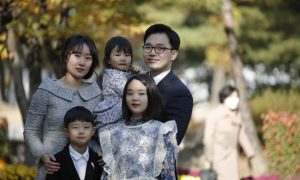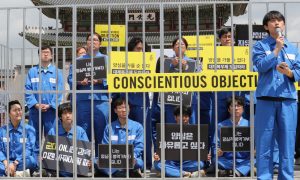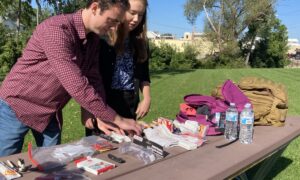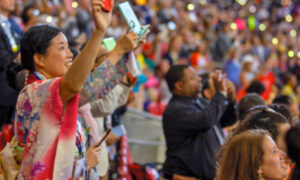FOR years it has been the same. At exactly 8:15 a.m., a hush falls over the throng of people gathered at the Peace Park, Hiroshima. They are observing a one-minute silence in memory of that catastrophic moment of 40 years ago. On August 6, 1945, an atom bomb exploded over Hiroshima, Japan. In one flash, the city was devastated, and some 80,000 people lost their lives. Three days later another atom bomb destroyed the city of Nagasaki, killing about 73,000 people.
From all over the world, thousands regularly come to commemorate this fateful event. This year, besides the usual parades, prayers, memorial services, and so on, there are special events such as the World Conference of Mayors for Peace Through Inter-City Solidarity—a meeting of the mayors of scores of cities in Japan and around the world.
Clearly, Japan wants the world to remember the lesson of her harrowing past.
Survivors Tell Their Stories
Reams of paper have been used to record the heartrending stories of those who survived the bombs. Though most survivors are now in their middle age, they still have vivid memories of “that day.” Here are their stories as told to an Awake! correspondent.
Nobuyo Fukushima, who remembers well her experience of the bombing in Hiroshima, relates: “I was cleaning the stairs in my house when suddenly a bright flash and a terrible blast knocked me unconscious. When I came to, I could hear my mother screaming for help. The house was in a shambles. I thought an earthquake had struck. When we made our way out of the house over to the riverbank, I saw many children and their parents with clothes burned to tatters and fused to their skin. I could not understand why they were so badly burned.
“When we got to the hospital, it was packed with people. The heads and faces of many of them were covered with blood, while others had burned flesh dangling in strips. The hair on some of them, being singed by the heat, was standing on end. Others, with fragments of wood and glass blasted into their body, were groaning deeply. Their faces were so bloated that it was difficult to tell one from the other. They all seemed to be pleading for water, but by the time water was brought to them, many were no longer breathing. My mother also died three months later from the effects of the bomb.
“The city had become one large, burned-out field, with only an occasional crumbling concrete wall still standing in the ashes. Nightly, there were fires on the riverbank where the dead were cremated. I vividly recall the red glow of the fires and the terrible odor of the burning bodies, like oily fish being grilled. I still shudder and feel sick at heart whenever I think of it.”
Tomiji Hironaka was one of the soldiers sent into Hiroshima immediately after the bombing to bring out any survivors from the prison there. Though he had served in the military for many years, what he saw at Hiroshima brought home to him the horror of war.
“The road was full of trucks loaded with the wounded. Those who could still walk staggered along by the roadside. Many were almost naked, except where patches of clothes had been burned into their skin. Piles of corpses, blistering red, were everywhere. The riverbanks were crowded with people trying to soothe the pain of their burns. Among them, I saw a mother, covered with red burns, holding her baby, also badly burned, trying pitifully to nurse it. I remember well the intense feeling I had then. ‘I hate war! I hate war!’ Yet, I had shared in killing, and I thought, ‘What kind of conscience do I have?’ I was keenly aware of my bloodguilt.”
Munehide Yanagi, a 14-year-old boy at the time, miraculously survived the bombing in Nagasaki. He was only 3,200 feet (980 m) from where the bomb exploded. “I was part of the student mobilization arrangement assigned to construct air-raid shelters,” he explains. “As we were working, I heard the drone of a large airplane that sounded something like a loud roar. Just as I was wondering if it was an American plane, I heard the cry: ‘Tekki!’ [‘Enemy plane!’] We threw down the things we had been carrying and ran with all our might for the shelter.
“At the instant I reached the concrete barrier in front of the air-raid shelter, there was an immense flash of blue-white light and a tremendous blast that threw me unconscious to the back of the shelter. The next thing I knew was being awakened by the agonizing cries of ‘Aigo! Aigo!’ [a Korean expression denoting deep emotion]. The cries were coming from someone with a face blackened by smoke and who was so severely burned that it was hard to tell if the person was male or female.
“Outside, it was like an inferno. I saw one of my schoolmates who was badly burned. His clothes had been shredded, and his skin was coming off. A girl who had been working with me had collapsed on the road—her lower legs were gone and she was pleading for water. I did not know where to get water but tried as best I could to encourage her.
“The fire ravaged the city. I saw burned-out telephone poles crashing into the streets, a train burning on the tracks, and a horse thrown into convulsions by the heat. The raging fire forced me to wade into the river. I was hot and frightened. Somehow I got home.” Later, Munehide’s gums started bleeding and he began to suffer from diarrhea. Even now he has chronic hepatitis. But he considers himself fortunate compared to many he saw that day.
A Lesson for All
The experience of the atom-bombings indeed left a deep scar on the minds and consciences of many people. Even those who have seen the aftereffects of the bombing have been deeply impressed with the horror and destructiveness of war.
Today, 40 years after the event, tension between the nations is increasing, and stockpiles of nuclear weapons are growing. Fear of a third world war and a nuclear holocaust looms ever so real. Understandably, more and more people throughout the world are urging all nations and peoples to remember the tragedy of Hiroshima and Nagasaki as a lesson for all. The 40th anniversary at Hiroshima is but one of many such expressions.
But have any of these efforts really brought the world closer to true peace? Are the horrors of nuclear war—the pain, suffering, and destruction—enough to make people renounce war? In fact, what lasting effect did the tragedy of Hiroshima and Nagasaki have on Japan as a nation as far as pursuit of peace is concerned?





